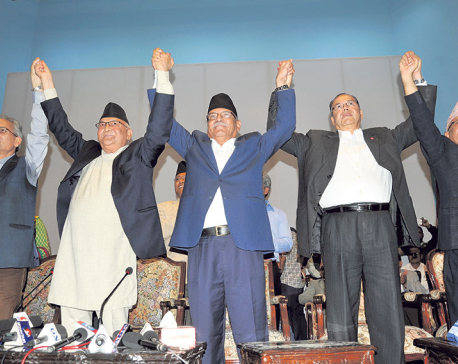
OR
Textbook shortage
Even in normal times, Janak Education Material Center (JEMC), the state-owned publishing house, struggles to print the 20 million textbooks required for students of Grades 6 to 10. At the start of February, with barely a month to go for the start of the new academic session, the center had printed only around 10 million books. Most of the time since has been consumed in the printing of ballot papers needed for the two rounds of the local election. With the supply of only half the number of textbooks needed, students across the country are struggling with their studies. To meet the shortfall, the center has asked Sajha Prakashan, another state-funded publisher, to share some of its textbook-printing burden. Interestingly, while private publishers can print textbooks for up to Grade Five, they have not been given the authority to print textbooks of Grade 6 or higher. But why not? If the goal is to ensure that private publishers don’t extort parents by arbitrarily fixing the prices of their books, this goal can easily be achieved if the center continues to print, say, quarter of the books, while contracting out the rest of the burden. The center’s cheap prices will keep private publishers in check.
In that case, the center can also play more of a monitoring role, keeping a close tab on both quality and cost of books from private publishers. For the primary goal should be to ensure students right across the country get their textbooks on time, so that their studies aren’t hampered. Under the new federal setup, the federal provinces will be able to design their own course books and school syllabus, as per the local needs. But it could be a long time before all the federal provinces are able to design their own syllabus and print their own textbooks. At least in the first few years of the implementation of the new provincial setup, the center will have to shoulder the bulk of the responsibility for syllabus-design and book-printing. This is why the perennial tardiness at the JEMC and its reluctance to contract out publication to private publishers is dispiriting. One reason for this inaction and delays is the overt meddling of political parties in these vital institutions, which have been turned into recruiting centers for the cronies of those in power.
Now that the government has adopted a new policy of turning around bankrupt vital state entities like Nepal Drugs and Birgunj Sugar Mill, through the injection of new capital and people, it should also think about improving the woeful state of our government publishers. Competent folks, not political cadres, should be appointed to run them: appoint the right people, allocate enough capital and let the organizations run independently. This is the only way these perennially loss-making entities can be use to the country. Since the government publishers have never been able to supply the required number of textbooks in the required time, involving private publishers also makes sense. Time has come to shake things up in these stodgy enterprises.
You May Like This

Old wine, old bottle
Last week, a grand coalition of all the leftist parties of Nepal was announced, much to the surprise of not... Read More...

Hundred years old Bhaktapur Hospital old and infirm
BHAKTAPUR, July 18: It is the country's second oldest hospital and, as its age, is frail and lacks the required... Read More...

Malnutrition claims 17-year old, others on the line
RAJBIRAJ, Dec 26: Shambhu Kumar Ram, 17, died on November 27. His family says that he died of malnutrition and lack... Read More...




Just In
- Govt receives 1,658 proposals for startup loans; Minimum of 50 points required for eligibility
- Unified Socialist leader Sodari appointed Sudurpaschim CM
- One Nepali dies in UAE flood
- Madhesh Province CM Yadav expands cabinet
- 12-hour OPD service at Damauli Hospital from Thursday
- Lawmaker Dr Sharma provides Rs 2 million to children's hospital
- BFIs' lending to private sector increases by only 4.3 percent to Rs 5.087 trillion in first eight months of current FY
- NEPSE nosedives 19.56 points; daily turnover falls to Rs 2.09 billion















Leave A Comment